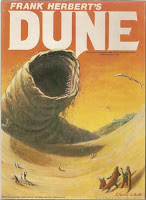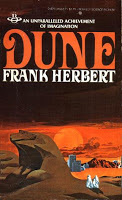Frank Herbert’s Dune books are one of my favorite science fiction series of all time. Every two or three years, I try to re-read the entire thing (ditto Lord of the Rings, I should add). I realize it’s not to everyone’s taste, but it most certainly is to mine. I am also a huge fan of Avalon Hill’s game (perversely, it was a love of the game that led me to read the books in the first place), but have never had the chance to read the role-playing game. I understand the latter goes for astronomical prices on eBay. The less said about the attempts of his son to continue and expand the series, the better.
One of the many themes of the series is the notion that Prescience (the ability to accurately see the future, granted by a combination of both the Spice and the genetic engineering of the Bene Gesserit over countless generations; a variation of the same is used by the Guild Navigators to predict safe flight paths for their enormous Highliners as they travel through space) “locks in” the future. Without a Prescient observer, the future is open and in flux, and thus subject to human Free Will.
However, once Prescience is used to observe the future, much like Schrödinger’s cat, its unknown state becomes known and the future becomes locked into place. This becomes a central theme of Children of Dune and God Emperor of Dune, where Leto’s “Golden Path” is seen as a path of liberation from the Prescient trap that his father, Muad’dib, has inadvertently laid by seeing too much of the future. Leto is attempting to free humanity of the future that has been locked into place, and does so ultimately at the cost of his own life*.
 In RPG terms, the same effect can be said to take hold, when it comes to divination. Spells that predict future events place the game master in something of a bind, but it should always be remembered that it is a bind of the spell caster’s own making. In Adventures Dark and Deep, this is brought out explicitly in spells like “Luck”, which states “This spell allows the caster to know when someone is going to have a “lucky streak.” The spell is not, in and of itself, creating the streak of good luck, but rather is simply observing it, and having done so, the lucky streak is becoming ingrained into the fabric of reality, granting the creature observed certain bonuses.
In RPG terms, the same effect can be said to take hold, when it comes to divination. Spells that predict future events place the game master in something of a bind, but it should always be remembered that it is a bind of the spell caster’s own making. In Adventures Dark and Deep, this is brought out explicitly in spells like “Luck”, which states “This spell allows the caster to know when someone is going to have a “lucky streak.” The spell is not, in and of itself, creating the streak of good luck, but rather is simply observing it, and having done so, the lucky streak is becoming ingrained into the fabric of reality, granting the creature observed certain bonuses.
In real terms, however, those aren’t bonuses. They’re simply nudges of probability in game terms to make random outcomes align more closely to the predicted “lucky streak”. And once that predicted lucky streak has been predicted, the laws of the universe (i.e., the behind-the-scenes rules of the game) are altered to accommodate the prediction.
This same principle can be used for any sort of future-prediction, and neatly answers the question of free will. There’s free will, all right, but once the outcome of the choices are observed (i.e., divined), those choices have become, in effect, already made.
__________
* No, you don’t get spoiler warnings for a book that was published in 1981. Hey! Cujo has rabies! Surprise!










Hey man, thanks for some Dune props! It's tough to find others who are Dune fans, in my experience. I love the original series. As for Brian Herbert's work, well, it ain't Frank but I don't despise it. Sorry, don't want to make you upset! I approach Brian's stuff as non-canon for the most part, almost like fan fiction. Think of is Dune-lite. Something for a quick fix.
So Brian Herbert is kind of like huffing paint?
I absolutely love Dune. It's almost time for me to re-read the series, myself!
It's a great series, and the fans of it I have encountered all re-read the 'core books' periodically. So many great themes/symbols at work.
Although I accept Chapterhouse:Dune as the last book, I love how Herbert's series really could end with the closing of any of the books.
I still hold out hope that someone will make a decent movie out of God Emperor of Dune.
Anyone else gobble up The Dune Encyclopedia?
I first read 'Dune' in 1981 (same year that I first played D&D as well) when I was 11. I had been staring at it in Waldenbooks for several years (as I had the AD&D hardcovers) and had also seen the SH game in Circus World (and 1E Gamma World). When I entered middle school, the campus library had a copy and I quickly devoured it. I've read it at least once a year myself.
LotR, however, does not get the same treatment; it's once every 2-3 years. The Silmarillion is read every year (since I read it first. I recall seeing the evocative PB cover of the drowning of Numenor in 1978 or so in, of all things, the book section of a Kroger's grocery store (which also sold the 1E hardcovers and had Holmes boxed set on the toy isle!)
I have read the original Dune novel so many times I lost count long ago. Read it every year, just like Lovecraft. I've only read the other original novels once…well, with the exception of Dune Messiah, which I've read twice.
I agree with scottsz: you really could stop reading at the end of any of the original books, and just consider the end of that particular book to be the end of the story. That's just part of Frank's genius.
FH's books had deeper significance. Brian Herbert/Kevin Anderson's books, however, are just the escapist, fluffy space opera version of Dune.
I finally got around to the first Dune book this past year. I had seen both movies but decided it was time to actually read the thing. But it is a rather big tome – so as a compromise with time, I decided on one of my many long road trips to listen to the unabridged Audio Version. Very good read…err…listen.
I was a big fan of the DOS RTS game. It was really tough, but one of the better DOS games back in the day.
The internal dialogue Leto had just before he died, are to me, one of the greatest pieces of writing I've seen in sci-fi character development.